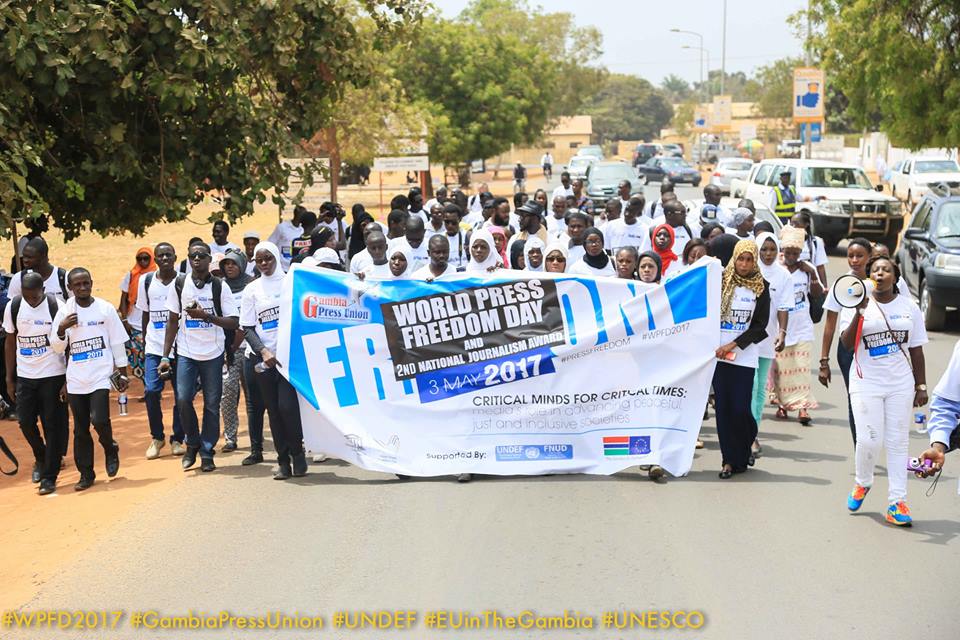By Halimatou Ceesay
State and Human Rights lawyers on Wednesday 22nd November, 2017 battle over deleting sedition, libel, defamation, false publication among others from Gambia’s Constitution at the Supreme Court of the Gambia before s member panel of judges.

Photo Credit: GPU
“I urge that these laws are struck out of our law books because they criminalizes speech; declare them void because they do not pursue legitimate aim, and even if they do, they are disproportionate in their application,” Awa Sisay-Sabally said.
Mrs. Sisay-Sabally is leading a team of three women, human rights lawyers (Sagarr Jahateh and F. Mahoney) who tied their waists to defend the freedom of the media since 2015 when the political and security situation was largely uncertain. They are challenging several provisions of the Gambian constitution and the Criminal Code that are believed to run contrary to the constitution.
“These provisions are in clear violations of Article 19 of the universal Declaration of Human Rights, Article 9 of the African Charter on Human and People’s Rights, Article 19 on International Covenant on Civil and Political Rights and the EOWAS supplementary protocols,” lead lawyer told the panel of judges.
“It’s chilling effects is that journalists would not know what to write that will not be punishable by these laws; and the population will not know what utterances would constitute sedition as no guidelines have been provided in its application,” she added.
She further stated that, these laws depend on the discretion of authorities to arrest, detain and imprison journalists, especially under a dictatorship, could discourage journalists from carrying out their jobs due to constant risks they pose.
She said a proper scrutiny of the laws reveal that it is press freedom and freedom of expression that are under attack as the said laws did not fulfil any of the cardinal principles of law in a democratic society.
Dozens of journalists Sisay disclosed were victimized by these laws under the Yahya Jammeh regime. “It’s not just the journalists who suffered and will continue to do so under these laws – the rights of news readers and audience and entire Gambian population at large to receive information as guaranteed by Article 19 and 9 of the Universal declarations and the African Charter respectively are being violated”.
“Section 207 of the Constitution places the responsibility on the press and other media to hold the government accountable to the people of The Gambia. This can only be done if the laws are certain and the journalists are free to carry out this function.
Section 209 of the 1997 Constitution provides for limitations as “may be reasonably required in a democratic society”. To this, Counsel Mrs Sisay-Sabally told the judges that common law exists to be used by anyone that feels aggrieved by the reporting of the media to seek redress, instead of making a special set of laws for punishing journalists.
“Even in the case of false news, it depends on what people believe and in the case of this law, it makes the entertainment aspects of journalistic work such as cartoons and satire impossible. These are excessive, unconstitutional and do not deserve to be in our law books,” she said.
Representing the state, Counsel Binga D admits that all but one aspect of the said laws is unconstitutional. He told judges that the state seeks to maintain the law on false publication and broadcasting as the rights argued by the counsel for the press union, are not absolute.
These he said, are subject to restrictions by law, as necessary in a democratic society. The arguments advanced on that particular provision were unrealistic and not based on law said Counsel Binga.
“The state has the responsibility to promulgate laws so as to protect the interests of the public,” Binga said, citing national security, public safety, and public moral as grounds for those laws to remain, adding that false news can threaten national security, endanger public safety, public morality and decency.
The session has been adjourned to allow the court to make a decision on the constitutionality or otherwise of the said laws.
